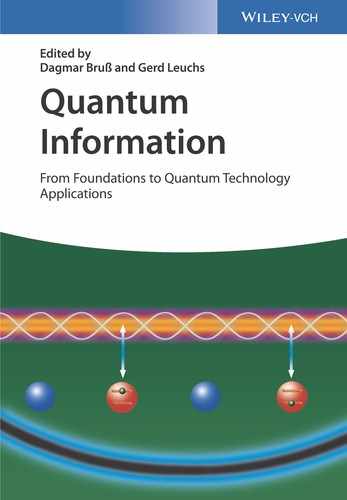Preface to Lectures on Quantum Information (2006)
Quantum information processing and quantum communication has developed into a very active field in the last decade. A number of countries devote sizeable funding to the topic, and several books were already published in the field. Why yet another book? We think that the answer is obvious: this book is special. The starting point was a week‐long summer school on quantum computing and related topics, funded by the Heraeus Foundation and held in 2000 in the Physikzentrum at Bad Honnef near Bonn, Germany. It was at the time when quantum information in Germany was picking up momentum. About 80 students enjoyed the exciting and stimulating atmosphere, studying the modern topic in the old mansion. The barrel vault basement had sufficient supplies of beer and wine to fuel night‐long discussions of some hard‐liners on the topics of the day: Can one really do quantum computation with NMR although the density matrix is separable? Are there many algorithms for which a quantum computer, once it is built, will outcompete standard Turing machine type computers? The classical Toffoli gate can copy one input channel to two output channels, a perfect cloner; what is the corresponding operation for the quantum version of the Toffoli gate? Can one be sure that factorization is as hard and complex a problem as security agents like to make us believe? Are the coherent states of light, emitted by standard lasers, “quantum” enough to be a worthwhile resource for quantum communication?
This special, very enjoyable, and fruitful school atmosphere triggered a process that ultimately led to putting together this book to which most of the lecturers have contributed a section. We approached a few additional distinguished colleagues and they also agreed to provide a section. During the school, it had turned out that one of the participants had detailed knowledge about a topic that was not covered by the lecturers, and he was talked into giving an improvised lecture, which turned out to be a great success. That lecture is also included. Each of the lectures is self‐contained and written in a tutorial style, at the same time providing insights into today's hot topics in quantum information. We hope that this book covers an unusually wide spectrum of quantum information themes and that the reader may benefit from its diversity and variety.
In all the excitement, there is also sadness. Last year Thomas Beth, one of the prominent lecturers at the school and always in the midst of the most intense discussions, lost his brave fight against cancer and died much too young. Friends and foes concede that he deserves the credit for pioneering quantum information in Germany. After studying mathematics and medicine and receiving a chair in computer science, he may have been burning the candle from both ends. Thomas Beth achieved so much and yet could not sit still in view of the many things out there to discover. We miss him and dedicate this book to his memory.
May 2006
Dagmar Bruß and Gerd Leuchs
Düsseldorf and Erlangen
